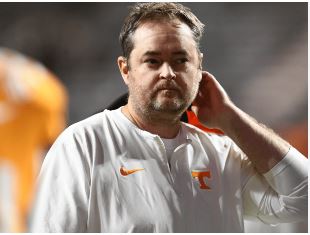
The Tennessee Volunteers, a storied program in college football, have found themselves in the midst of controversy following the suspension of their head coach over allegations of gambling violations. The decision, announced by the university in a recent press release, has sent shockwaves through the sports community, raising questions about the implications for the program, the coach, and the broader landscape of college athletics.
The Allegations and Suspension
The university’s press release provided limited details but confirmed that the head coach, whose name has been withheld pending further investigation, has been suspended with pay. The suspension came after reports surfaced suggesting that the coach may have engaged in activities that violated NCAA regulations related to gambling. Specifically, the allegations involve betting on college football games, which is a serious breach of NCAA rules designed to maintain the integrity of the sport.
Gambling in college athletics has become a hot-button issue, particularly as the landscape of legal sports betting evolves. The NCAA has strict policies to prevent any potential conflicts of interest or corrupt practices. These rules are intended to ensure that the outcome of games remains fair and unbiased, free from the influence of financial gain. Any breach of these rules is taken very seriously, as it threatens the credibility and trust placed in college sports.
The Coach’s Background and Impact
The suspended coach had been with the Tennessee Volunteers for several seasons, during which time he had built a reputation for strong leadership and strategic acumen. Under his guidance, the team had achieved notable success, including several high-profile victories and bowl game appearances. His suspension, therefore, represents a significant blow not only to the team but also to his own career.
For the Volunteers, the timing of the suspension is particularly challenging. With the college football season already underway, the team faces the difficult task of navigating the rest of the season without their head coach. This disruption could have repercussions on the team’s performance and morale. Assistant coaches will be thrust into the spotlight, and the coaching staff will need to adapt quickly to ensure that the team remains competitive.
Reactions and Next Steps
The reaction from the Tennessee football community has been one of shock and concern. Fans and analysts have expressed their disappointment, highlighting the potential impact on the team’s season and the coach’s legacy. The university has promised a thorough investigation into the matter, emphasizing their commitment to upholding the highest standards of integrity in athletics.
In the interim, the university is expected to implement measures to mitigate the impact of the suspension. This may include promoting an assistant coach to the role of interim head coach or possibly bringing in external consultants to assist with the transition. The primary goal will be to stabilize the team and maintain focus on the remaining games of the season.
Broader Implications for College Sports
This scandal underscores a growing issue in college athletics: the intersection of sports, gambling, and regulation. As more states legalize sports betting and online gambling becomes more prevalent, the NCAA faces increasing challenges in monitoring and enforcing its rules. The Tennessee situation is a stark reminder of the need for vigilance and strong ethical standards within college sports programs.
Universities across the country are likely to review their own policies and practices in light of the Tennessee scandal. There may be increased emphasis on educating athletes and staff about gambling regulations and potential consequences. Additionally, the NCAA might consider updating its guidelines to better address the evolving landscape of sports betting.
The Path Forward
As the investigation progresses, the Tennessee Volunteers will need to focus on managing the fallout and preparing for their upcoming games. The coach, meanwhile, faces a difficult period of uncertainty, with potential legal and professional repercussions on the horizon. His future with the program—and in college football—hinges on the outcomes of the investigation and any subsequent disciplinary actions.
The Tennessee Volunteers have pledged transparency and cooperation with the ongoing investigation. They will need to navigate this challenging period carefully to restore trust and maintain their competitive edge. For fans and stakeholders, the hope is that the situation will be resolved swiftly and fairly, allowing the focus to return to the game and the athletes who play it.
In conclusion, the suspension of the Tennessee Volunteers’ head coach due to gambling allegations represents a significant moment in college football. It highlights the ongoing challenges facing the NCAA and the broader sports community in managing the intersection of gambling and athletics. As the investigation unfolds, the implications for the coach, the team, and the sport as a whole will become clearer, but for now, the immediate focus remains on navigating this turbulent period and ensuring the integrity of the game.
Leave a Reply